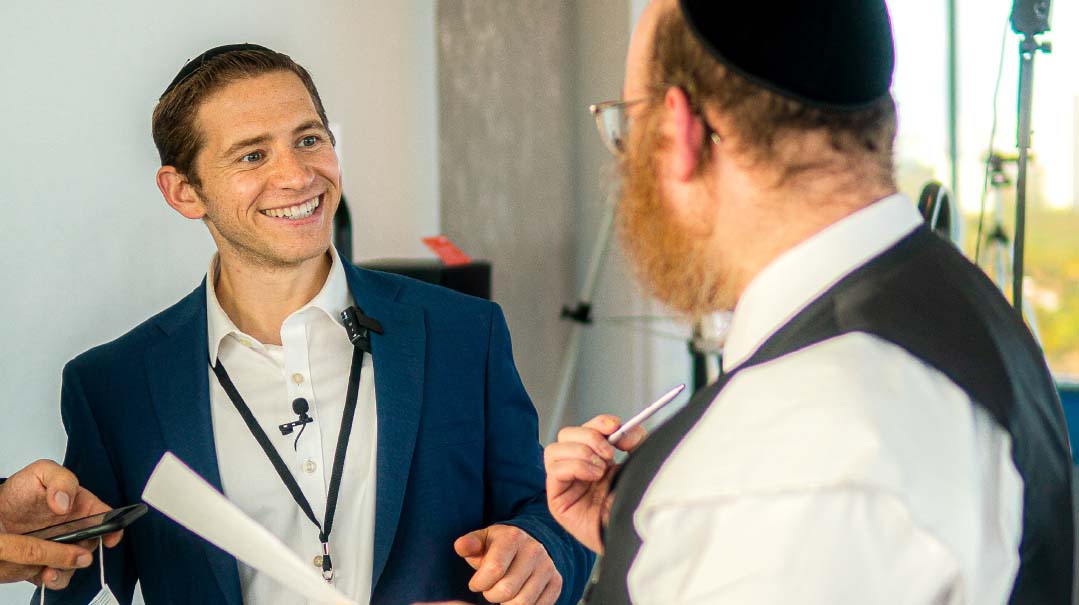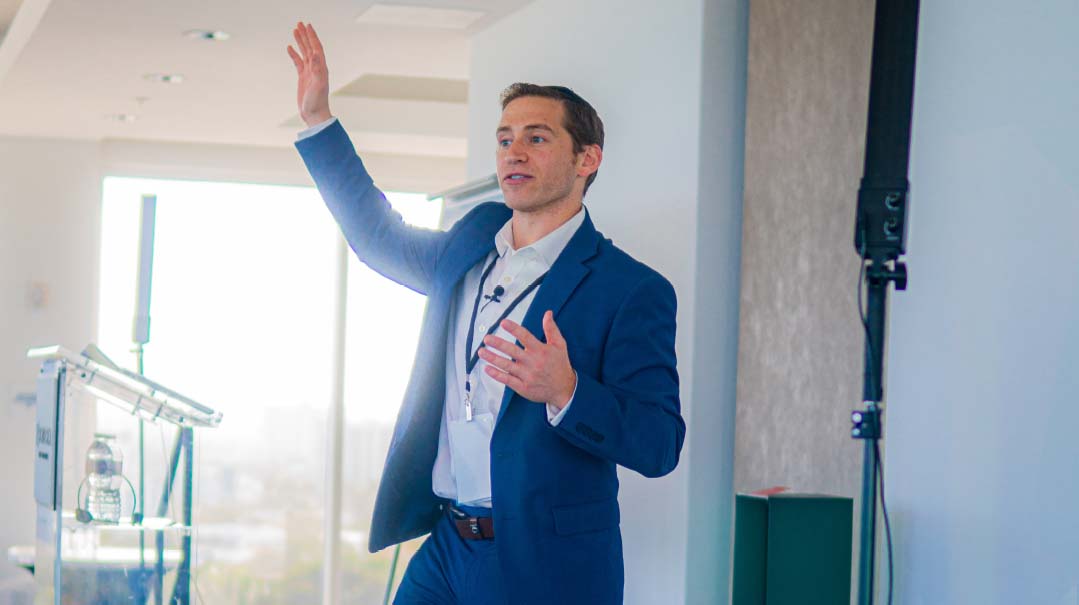Breakthrough Business
| December 7, 2021Life is a journey, and business is, too — and you’re invited to join us for the ride!

Who: Isaac Bardos, Founder of Breakthrough Business, LLC, based in Boca Raton, Florida, as well as three other businesses in several industries.
Where: While I’m based in Florida, I’ve served clients across four continents: North America, Europe, Asia, and Africa. I’ve been seeing clients on Zoom since 2015, and I travel around the United States to run high-energy, in-person team and management trainings.
When: I founded Breakthrough Business almost six years ago, after coaching people informally for nine years.
What: Breakthrough Business is my business coaching company. We help businesses owners scale their business while freeing up their time using the “five pillar scaling to freedom” system.
Many people start a business because they fall in love with the product, service, or idea they’re offering, taking their passion and turning it into a business. They try to grow that business with sheer willpower — but when the will runs out, so does the power; literally and figuratively, the business is out of business.
Others see tremendous financial opportunity, so they invest, take risks, and see where it goes. The problem is that as the business grows, they need more hands on deck, a better way to stay organized, and team and management skills all around. Not to mention that they need to put together sales, marketing, and operations teams, so they’re not doing it all.
Often, such owners get stuck in what I call “the stress cycle”— the more they want to increase their profits, the more they feel they need to sacrifice their personal life to have the money to fund their lifestyle, which is a backward mentality. Without the systems, processes, and objective perspectives to grow a business, owners essentially build their own gilded jail cell. The business is beautiful. It’s golden. It’s worth way more than when it launched — but the owner can’t get out. The hardest working employee there doesn’t have the freedom he got into the business to enjoy!
Why:
As my personal coaching clients gained confidence and clarity, they wanted to start their own businesses, and they asked me to continue coaching them. You know what I found? People are their patterns, and that creates problems. You cannot scale a business or free up your time when you keep using the same strategies you’ve always used, solving problems along the way. Your thinking methodology determines your decisions, which then determine where your business will be in a month, in a year, or even in three years. Drastic business growth requires a new style of decision-making, which means the owner needs new operating processes; this was the case with my own businesses.
When thinking about how to proceed professionally, I realized that frum business owners often employ frum families, and they’re usually respected and capable leaders. Working with someone whose hand is in communal causes and whose business supports many families means my work with just one person can help many. By focusing my coaching on business owners, I could actually have an impact on the Jewish community!
In this column, we’ll explore the problems businesses often face and how we work to solve them behind the scenes. I’ll introduce you to real clients from various industries, and together, we’ll share the ins and outs of the grit, grind, and reward of entrepreneurship. You’ll meet business owners (names and identifying information changed) and see what we do on the inside to diagnose the issues, guide them and their personnel, and get their businesses back on track.
Life is a journey, and business is, too — and you’re invited to join us for the ride!

Most business management issues are due to…
… people. If they were due to just processes, you could simply copy the process another successful company uses, plug it into your business, and problem solved. It doesn’t work that way, mainly because the process must work with the people implementing them, and each business needs processes that complement its workflow, people, and personalities. You also need a management team that really gets it and has the capacity — timewise and intelligence-wise — to execute the processes and steer the ship when they aren’t followed properly.
The simple key most prospective business owners are missing is…
… if you start a business because you want more security in your life and control over your time, you’re in for a stressful journey.
I compare business to a boat — it can be very lucrative, but it can also crash and destroy everything on board. To be honest, if you want security and a steady flow of income, get a job. Yes, when you own a business, you may benefit from financial security and control over your own time — until the business starts to grow or new factors come into play; we all saw during Covid that owning a business doesn’t guarantee financial security. But if you’re a strong person who’s in it for the long haul, if you’re ready for risk, hungry to grow, and don’t fear rejection and failure, you have a shot at entrepreneurial success — assuming you have a great product or service to offer.
Anyone opening a business should realize that…
… it’s a warrior sport. Your greatest asset is you, and the most important part of you is your mindset and energy. These are two things you must work on constantly, yet you rarely hear people discussing them, because it’s more attractive to talk about marketing and sales. Conversely, the chokehold of a business can be the owner, and you need to be mindful not to get in the way of your business’s growth.
Turning around a business depends on…
… willingness. Stubborn people are usually resistant to change, but rehabilitating a business takes resilience, not resistance. The first creates immunity to economic changes, the second is deadly.
The business I’d never take on is…
… a business that doesn’t serve a greater purpose and impact beyond making money — basically, something I think is pointless or extremely superficial. Business is a spiritual pursuit, it’s about personal development even more than money. While finances are an absolute necessity and a primary focus, if money is the only value and motivation, it’s likely to lead to a toxic, selfish work environment.
I also don’t take on clients whose leadership team isn’t ready to change. Inflexible leadership is kryptonite for an organization that wants to grow. This is actually a major issue in many nonprofits and for-profits — on the outside they look like they’re doing fine, but in reality, there are serious internal issues. Every business and industry faces changes at some point, and resistance to strategic change and trying new things is a recipe for stress and struggle.
I gave my business away, and now I want it back,” Michael tells me in desperation in our first conversation. “It’s my baby, it’s how I’ve been feeding my family for three years — but I almost feel like I have no choice anymore, and I should just cut my losses.”
I had met Michael, an entrepreneur in his late thirties, through a mutual friend. He is jovial, smart, and well liked; I could tell he’s the kind of guy people get along with easily. When I explained what I do as a business coach, he immediately said, “We should talk.”
The issue, Michael explains in our first Zoom meeting, is that he’s desperate for cash. Michael is hundreds of thousands of dollars in debt, his business credit cards are maxed out, and he’s invested all he had in his business, financially and emotionally.
Michael is the type of guy who greets you with a smile — even before his first coffee, and this is someone who gets up at 5:30 a.m.! He’s optimistic, a go-getter, and usually pretty confident.
But not today. Through the screen, his face tells a different story.
Michael starts by giving me some background about his business, Foodies. He started the online upscale kitchenware business three years ago, and it’s boasting a respectable $30,000 to $50,000 in monthly sales — yet the company isn’t turning a profit.
Michael can’t make sense of it, of the fact that he’s worked so hard to get where he is, and now it’s failing. I can see despair and fear about the future of Foodies all over his face.
“If we’re making this much in sales — why isn’t it showing in the bank? Where are all of our profits?” Michael puts his hands over his face and lets out a groan while rubbing his eyes.
“Whenever I think about it, I get a pit in my stomach. I look at the books, talk to my managers, check on our ads, and try to strategize about growing this business, but I feel like I don’t even know where to start!”
I ask Michael how he spends his time each day, and he walks me through his routine.
“The first thing I do when I get to the office is open my emails,” he says. “Usually, that leads to a list of things that need to be done, because my inbox is full of vendors complaining they haven’t been paid, delivery and shipping issues, and problems with orders and supply. By the time I finish dealing with everything, more than half the day is gone…”
His voice trails off.
“Michael,” I say gently, “It looks like you’ve become so focused on trying to put out fires, you’ve forgotten what led you to this level of success. You’re stuck in this pattern of frustration.”
I’ve seen it time and again in businesses, where owners want to get out of a situation but don’t have a clear plan, so they try the same things over and over. But sticking with what you already know even when it’s not working leads to business breakdown and burnout.
I take a moment to paint Michael a picture.
“I like to compare this to a car that’s stuck in the mud,” I say. “The driver steps on the gas, the wheels spin furiously, but that only digs the tires in deeper.”
Pause.
“That’s me,” Michael admits simply.

I know Michael can turn things around and reverse every one of the reasons he thinks he should just cut his losses, and I’m pretty sure he can triple his take-home profit in the process. It’s possible to build a clear path forward — but first, we need to pinpoint where and why things have gone south.
The business started off strong, so the burning question is what happened — how did it go from strong to struggling? When did things change?
A year ago, Michael was buying larger orders for the upcoming holiday season. He hired new employees, moved inventory to warehouses, invested in a new marketing strategies, and delegated responsibilities to a new manager. To afford those changes, Michael leveraged his credit card lines and personal bank accounts, thinking the inventory would sell during the holiday season and he would make a profit quickly.
But it didn’t exactly go as planned — when the holiday season ended, inventory had barely moved! Michael hadn’t gotten the volume of orders he’d expected, and the company took too long to fill the orders they did get, which led to an influx of refund requests and a drop in customer ratings. Michael’s vendors wanted payment, but his products weren’t selling fast enough, and he needed money to cover his mortgage and feed his family. Michael was in debt, and it was bad.
Enter Michael’s friend Josh, who approached Michael and told him he wanted to partner with him.
“My father is looking for a promising startup as an investment opportunity,” Josh explained. “He’ll invest in your company, and I’ll join as an equal partner.”
Michael was excited — what a great break for Foodies, which desperately needed the money!
The way he describes it reminds me of my years coaching singles. Sometimes, each party has “what the other is looking for” and it’s a great match on paper. But it doesn’t always play out that way…
I ask what happened in the first year after he made this investor agreement.
Michael runs his fingers through his hair and exhales in aggravation.
“Josh is slow-moving, likes to look through everything, question each line, and ask his friends and family for their opinions, so decisions take forever. If I see an opportunity, I work the numbers, and if it makes sense, I go for it before the chance is gone.”
I know there’s more here than just a personality mismatch. Michael has built this business from the ground up; he is heavily invested. Josh, on the other hand, essentially bought his way in. Understandably, he doesn’t feel the same level of urgency.
But there’s an even bigger problem at play: Michael tells me that when he agreed to take Josh on as a partner, he gave him a fifty percent-share in the business. That means any major business decisions require Josh’s approval. Michael also promised to pay his investor, Josh’s father, a minimum of $200,000 a year, plus interest from expected profits.
I ask for the investor and partnership agreements, and I see Michael made a big mistake. Both agreements are too vague about each party’s roles and responsibilities in the company. Michael is working hard to pay off his debts and split the business earnings among him, Josh, and the investor — but the agreement doesn’t specify what is expected of Josh to help grow the business. That’s something we absolutely need to get to, but first we have to start where Foodies is hurting most — the cash flow.
To be continued…
(Originally featured in Mishpacha, Issue 889)
Oops! We could not locate your form.




